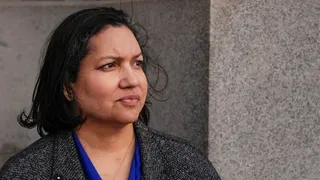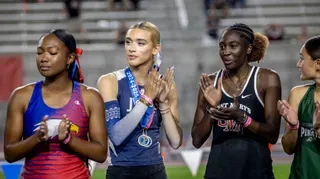January 15, 2012
BSO Reaches Out to LGBT Community; Donates $10,000 for Teen Suicide Hotline
Kevin Mark Kline READ TIME: 4 MIN.
The Broward Sheriff's Office recently donated $10,000 to a local organization to create a teen suicide prevention hotline.
That charity, Broward House, provides support to HIV patients and ensures they have all the things they need to survive without having to pay for assistance.
The funds will come from the Sheriff Office's Law Enforcement Trust Fund (LETF), which basically is money collected from drug busts and the seizure of any related assets.
"I've always said what a great thing to take money from bad guys and give it to good guys. It was a natural fit for our LTFE funding...Bad money used for good projects," Sheriff Al Lamberti said.
Lamberti explained that when Captain Rick Wierzbicki, of the Sheriff's Office Hate Crimes and Anti-Bias Task Force, approached him about the project he said it was a no brainer.
"I saw the movie Bullied. I also know that there have been a couple of incidents right here in Broward County," Lamberti said. "Then I saw the statistics and saw that for gay teens there is four times as high a suicide rate. Half of them have thought of committing suicide. That to me is crazy."
The BSO helped fund and distribute the Bullied movie which was produced by The Southern Poverty Law Center. It chronicles the story of Jamie Nabonzny, a student from Ashland Wisconsin, who stood up to his anti-gay tormentors with a federal lawsuit. That lawsuit led to a landmark decision that held school officials accountable for not stopping the bullying.
Because of their involvement with the film the BSO has been invited to Massachusetts to show the movie in the town where Phoebe Prince committed suicide in January of 2010.
"It was quite an honor to be asked to go up to Massachusetts," said Captain Wierzbicki. "The youth our are future and we need to do all we can do to protect them. That's why this is important. Everybody should have the right to go school in a safe manner and not be threatened."
The Broward House's new hotline should be up and running within the next month. They don't have a number for it yet.
Besides just helping HIV patients they also provide a wide array of services to the community.
"Shelter, food, water, toiletries, medicinal recommendations (they don't have their own pharmacy...yet), and providing contraception, you name it and we do it," said Terry DeCarlo, 49, director of public relations and marketing for Broward House. He emphasized. "We turn no one away."
The charity was founded in 1988 and now, after over 20 years in the business of helping those with HIV/AIDS, they've expanded their facilities to include 13 locations and a treatment pool of over 6,000. They are already already home to the "M" House, which caters to LGBT teens and offers different programs including movie nights and game nights, along with counseling services. This will be their first foray into teen suicide prevention.
"At the end of the rope, these kids can't talk to their parents, friends or teachers and we want to be that comforting source," DeCarlo said. "And even if we do that immediately for just a few kids who would have otherwise potentially committed suicide, we've accomplished our goals, and that which the donation seeks to advance."
DeCarlo is especially thankful for the support of the BSO.
"Sheriff Lamberti has been a major presence in the organization thus far. He shows up to our numerous events and is a supporter of what Broward House is trying to accomplish," he said. "This donation, while his first from the BSO is indicative, I think, of his showing up at our events and taking an active role in advancing our mission."
DeCarlo stressed that this will be a nationwide project.
"This isn't being built as an isolated project. We need to start out here and truly gauge what the need is in other places and we will expand to other places as necessary," he said. "The main thing is that not one teen who is even contemplating suicide is left without help."
DeCarlo adds that advertising will be done through various social networking channels, in addition to word of mouth.
"We're going to look to have a strong Internet presence in addition to having two manned phones as much as we can," he said.
The Internet and phone counselors, according to DeCarlo, will be able to not only speak with the teenager - whom he said may range from 13 to 23 - but will also help them use the resources immediately available to them despite their location.
"Listen, even if we get a call from Wisconsin, we will have the necessary numbers available to us to ensure that that child can not do harm to themselves and really to show them that there are people who care and want to help him out of this - even if they're thousands of miles away."
DeCarlo goes on to stress that while the percentage of LGBT teens contemplating suicide is higher than those of a "straight" teenager, the program itself does not discriminate.
"Much like the Broward House, there is no one we will turn away. It doesn't matter if you're LGBT or anything else," he said. "If you need help, that's what we're here for. Sexual orientation is not a part of our questionnaire."







